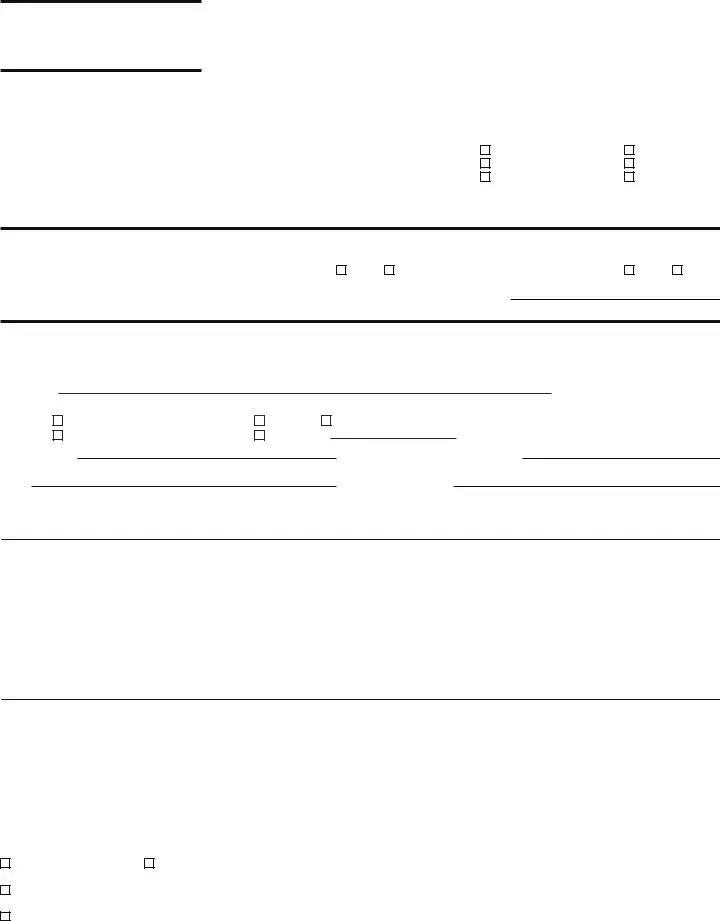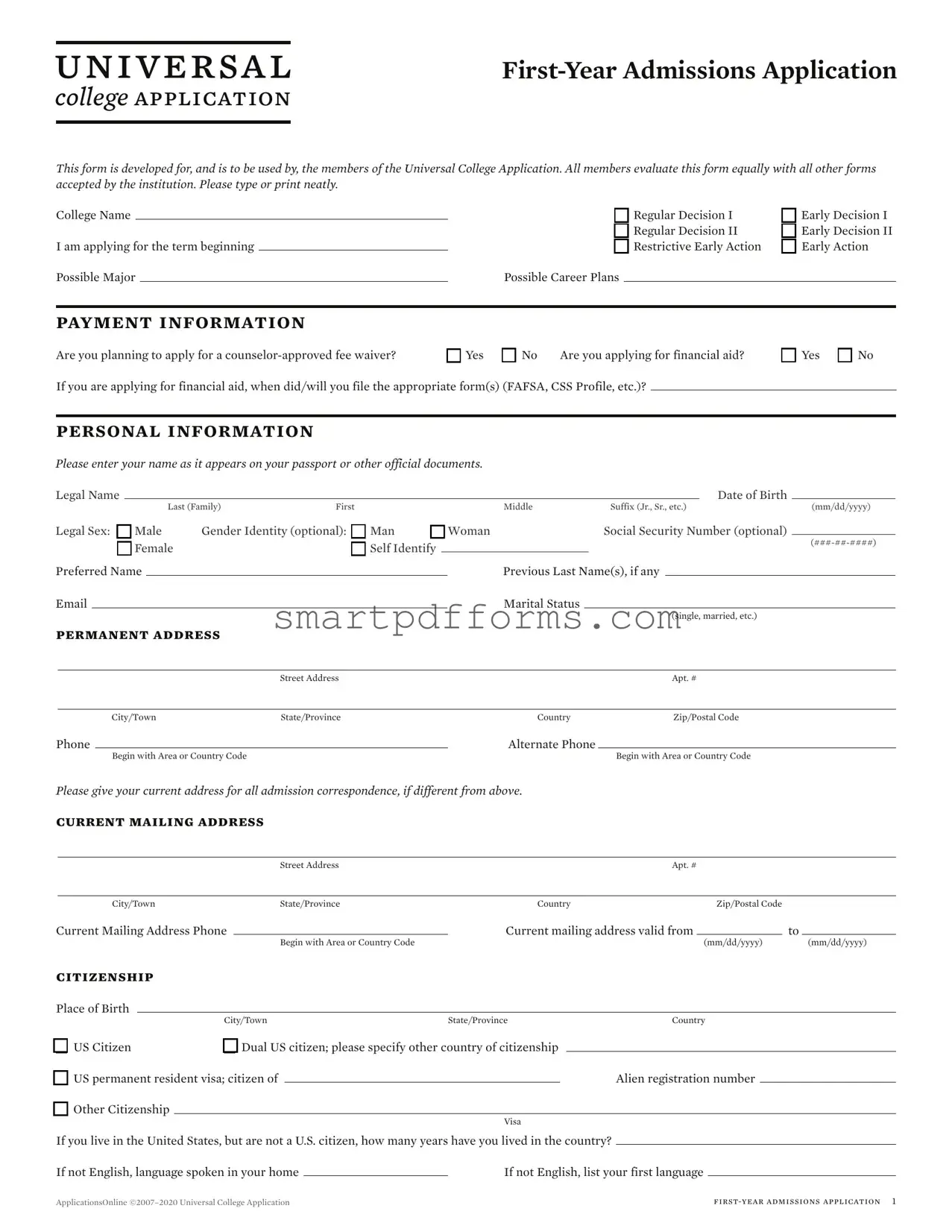Blank Colleges Application PDF Template
Embarking on the journey of higher education begins with the crucial step of completing college applications, a process that often evokes a mix of excitement and apprehension among prospective students. These forms are not just paperwork; they are the first chapter in a student's college story, offering a platform to showcase achievements, experiences, and aspirations. Detailing academic records, extracurricular activities, personal essays, and sometimes letters of recommendation, the college application form is a comprehensive document that colleges and universities use to assess an applicant's suitability for their programs. Crucially, it also often includes questions about personal and demographic information, ensuring that the institution can consider the whole person. As deadlines loom, students must navigate this process carefully, balancing the desire to present themselves in the best light with the need to remain authentic and true to their journey. The form, in essence, bridges the gap between the student's current achievements and future aspirations, laying the groundwork for a decision that will have a significant impact on their educational and professional trajectory.
Preview - Colleges Application Form

universal
college application
This form is developed for, and is to be used by, the members of the Universal College Application. All members evaluate this form equally with all other forms accepted by the institution. Please type or print neatly.
College Name |
|
|
Regular Decision I |
Early Decision I |
||
|
|
|
|
|
Regular Decision II |
Early Decision II |
I am applying for the term beginning |
|
|
Restrictive Early Action |
Early Action |
||
Possible Major |
|
|
Possible Career Plans |
|
|
|
payment information
Are you planning to apply for a |
Yes |
No |
Are you applying for financial aid? |
Yes |
No |
If you are applying for financial aid, when did/will you file the appropriate form(s) (FAFSA, CSS Profile, etc.)?
personal information
Please enter your name as it appears on your passport or other official documents.
Legal Name
|
Last (Family) |
First |
|
|
Legal Sex: |
Male |
Gender Identity (optional): |
Man |
|
|
Female |
|
|
Self Identify |
Preferred Name
|
Date of Birth |
|
|
Middle |
Suffix (Jr., Sr., etc.) |
(mm/dd/yyyy) |
|
Woman |
Social Security Number (optional) |
|
|
|
|
|
|
Previous Last Name(s), if any
Marital Status
(single, married, etc.)
permanent address
|
|
|
Street Address |
|
Apt. # |
|
|
|
|
|
|
|
|
City/Town |
State/Province |
Country |
Zip/Postal Code |
Phone |
|
|
Alternate Phone |
|
|
Begin with Area or Country Code |
|
Begin with Area or Country Code |
|||
|
|
|
|
||
Please give your current address for all admission correspondence, if different from above.
current mailing address
|
|
|
|
Street Address |
|
|
|
|
Apt. # |
|
|
|||||
|
|
|
|
|
|
|
|
|
|
|
|
|
|
|
|
|
|
City/Town |
|
State/Province |
|
Country |
|
|
Zip/Postal Code |
|
|
||||||
Current Mailing Address Phone |
|
|
|
|
Current mailing address valid from |
|
|
|
to |
|
||||||
|
|
|
|
Begin with Area or Country Code |
|
|
|
|
|
(mm/dd/yyyy) |
|
(mm/dd/yyyy) |
||||
citizenship |
|
|
|
|
|
|
|
|
|
|
|
|
|
|
||
Place of Birth |
|
|
|
|
|
|
|
|
|
|
|
|
|
|
|
|
|
|
|
City/Town |
|
State/Province |
Country |
|
|
||||||||
|
US Citizen |
|
Dual US citizen; please specify other country of citizenship |
|
|
|
|
|
|
|
||||||
|
US permanent resident visa; citizen of |
|
|
|
|
|
|
Alien registration number |
|
|
|
|||||
|
Other Citizenship |
|
|
|
|
|
|
|
|
|
|
|
|
|
|
|
|
|
|
|
|
|
|
|
Visa |
|
|
|
|
|
|
||
If you live in the United States, but are not a U.S. citizen, how many years have you lived in the country? |
|
|
|
|
|
|
||||||||||
|
|
|
|
|
|
|||||||||||
If not English, language spoken in your home |
|
|
If not English, list your first language |
|
|
|
||||||||||
|
|
|
|
|
||||||||||||
ApplicationsOnline |

ethnicity
Race/Ethnicity information is optional. Information you provide will not be used in a discriminatory manner.
Are you Hispanic or Latino? |
Yes |
No |
(country of family’s origin |
|
) |
How would you describe your racial background? (select one or more of the following categories):
Asian (country of family’s origin |
|
|
) |
Native Hawaiian or Other Pacific Islander |
|
Black or African American |
|
White |
|||
American Indian or Alaska Native (enrolled |
|
) |
|
||
Tribal affiliation |
|
) |
|
||
family information
parent/guardian #1
|
Parent |
|
Guardian |
|
|
|
|
|
|
|
|
|
|
|
|
|
|
|
|
||||
|
|
|
|
|
|
|
|
|
|
|
Title |
Last (Family) |
First |
|
|
|
Middle |
Suffix |
|||||
|
Male |
|
Female |
|
|
Living? |
Yes |
No (Date Deceased |
|
|
) |
||||||||||||
|
|
|
|
|
|
|
|
|
|
|
|
|
|
|
|
|
|
|
|
|
(mm/yyyy) |
||
If different from yours |
|
|
|
|
|
|
|
|
|
|
|
|
|
||||||||||
Address |
|
|
|
|
|
|
|
|
|
|
|
|
|
|
|
|
|
|
|
|
|
||
|
|
|
|
|
|
|
|
|
|
|
Street Address |
|
|
|
|
|
Apt. # |
|
|
|
|||
|
|
|
|
|
|
|
|
|
|
|
|
|
|
|
|
|
|
|
|
|
|
||
|
|
|
|
|
City/Town |
State/Province |
Country |
|
|
|
Zip / Postal Code |
|
|
|
|||||||||
Phone |
|
|
|
|
|
|
|
|
|
|
|
|
|
|
|
|
|
|
|
||||
|
Begin with Area or Country Code |
|
|
|
|
|
|
|
|
|
|
|
|
||||||||||
|
|
|
|
|
|
|
|
|
|
|
|
|
|
|
|
|
|
||||||
Profession |
|
|
|
Position |
|
|
|
|
|
|
|
|
|
||||||||||
|
|
|
|
|
|
|
|
|
|
|
|
||||||||||||
Employer |
|
|
|
|
|
|
|
|
|
|
|
|
|
|
|
|
|
|
|
||||
|
|
|
|
|
|
|
|
|
|
|
|
|
|
|
|
|
|
|
|||||
College Attended (if any) |
|
|
|
|
Degree Earned |
|
|
|
|
Year |
|
|
|||||||||||
Graduate School Attended (if any) |
|
|
|
Highest Degree Earned |
|
|
|
Year |
|
|
|||||||||||||
|
|
|
|
|
|
|
|||||||||||||||||
parent/guardian #2 |
|
|
|
|
|
|
|
|
|
|
|
|
|
||||||||||
|
Parent |
|
Guardian |
|
|
|
|
|
|
|
|
|
|
|
|
|
|
||||||
|
|
Title |
Last (Family) |
First |
|
|
|
Middle |
Suffix |
||||||||||||||
|
|
|
|
|
|
|
|
|
|
|
|
|
|
||||||||||
|
Male |
|
Female |
|
|
Living? |
Yes |
No (Date Deceased |
|
) |
|||||||||||||
|
|
|
|
|
|
|
|
|
|
|
|
|
|
|
|
|
|
|
|
|
(mm/yyyy) |
||
If different from yours |
|
|
|
|
|
|
|
|
|
|
|
|
|
||||||||||
Address |
|
|
|
|
|
|
|
|
|
|
|
|
|
|
|
|
|
|
|
|
|||
|
|
|
|
|
|
|
|
|
|
|
Street Address |
|
|
|
|
|
Apt. # |
|
|
|
|||
|
|
|
|
|
|
|
|
|
|
|
|
|
|
|
|
|
|
|
|||||
|
|
|
|
|
City/Town |
State/Province |
Country |
|
|
|
Zip / Postal Code |
|
|
|
|||||||||
Phone |
|
|
|
|
|
|
|
|
|
|
|
|
|
|
|
|
|
|
|
||||
|
Begin with Area or Country Code |
|
|
|
|
|
|
|
|
|
|
|
|
||||||||||
|
|
|
|
|
|
|
|
|
|
|
|
|
|
|
|
|
|
||||||
Profession |
|
|
|
Position |
|
|
|
|
|
|
|
|
|
||||||||||
Employer |
|
|
|
|
|
|
|
|
|
|
|
|
|
|
|
|
|
|
|
||||
College Attended (if any) |
|
|
|
Degree Earned |
|
|
|
|
Year |
|
|
||||||||||||
Graduate School Attended (if any) |
|
|
|
Highest Degree Earned |
|
|
|
Year |
|
|
|||||||||||||
Your parents are |
|
|
|
If divorced, list date |
|
|
|
|
|
|
|
||||||||||||
|
(married, divorced, etc.) |
|
|
|
(mm/yyyy) |
|
|
With whom do you reside? |
Both |
Parent/Guardian#1 |
Parent/Guardian#2 |
Other (Explain) |
|
||
List names, legal sex, and ages of your siblings, college (if any), degree(s), and dates of attendance. |
|
|
|||||
Name |
Legal Sex |
Age |
Institution |
|
Degree(s) |
Dates |
|
|
|
|
|
|
|
|
|
|
|
|
|
|
|
|
|
|
|
|
|
|
|
|
|
ApplicationsOnline |

academic information
School |
|
|
|
|
|
|
|
|
|
|
|
|
|
|
|
|
CEEB Code |
|
|
|
Type of school: |
Public |
Private |
Correspondence |
Charter |
|
|
Parochial |
Other/Education Provider |
||||||||||||
School Address |
|
|
|
|
|
|
|
|
|
|
|
|
|
|
|
|
|
|||
|
|
|
|
|
|
|
|
Number and Street |
|
|
|
|
|
|
|
|
|
|
|
|
|
|
|
|
|
|
|
|
|
|
|
|
|
|
|
|
|
|
|
||
|
|
|
City/Town |
|
State/Province |
|
|
|
Country |
|
Zip/Postal Code |
|
|
|||||||
Start Date |
|
|
|
|
|
|
|
|
|
Date of Graduation |
|
|
|
|
|
|||||
|
|
|
|
|
|
|
(mm/yyyy) |
|
|
|
|
|
|
|
|
|
|
(mm/yyyy) |
|
|
Counselor’s Name |
|
|
|
|
|
|
|
|
Phone |
|
|
|
|
|
||||||
|
|
|
|
|
|
|
|
|
|
|
|
|
|
|
Begin with Area or Country Code |
|
|
|||
Counselor’s Email |
|
|
|
|
|
|
|
Fax |
|
|
|
|
|
|||||||
|
|
|
|
|
|
|
|
|
|
|
|
|
|
|
Begin with Area or Country Code |
|
|
|||
Are you currently enrolled in school? |
Yes |
No |
Will/did you graduate from High School early? |
Yes |
No |
|||||||||||||||
Did you recieve a GED? |
Yes |
No |
If so, list date: |
|
|
|
|
|
|
(Please send official scores from testing agency) |
||||||||||
|
|
|
|
|
|
|
|
|
|
|
|
|
(mm/yyyy) |
|
|
|
|
|||
If your education has been interrupted, please detail your activities since last enrolled. Please attach your response to the end of the application.
current year’s courses
Please list name, level (Honors, AP, IB, etc.) and credit value of your current year’s courses.
Semester #1/Trimester #1 |
Semester #2/Trimester #2 |
Trimester #3 |
|||
|
|
|
|
|
|
|
|
|
|
|
|
|
|
|
|
|
|
|
|
|
|
|
|
|
|
|
|
|
|
|
|
|
|
|
|
|
|
|
|
|
|
List all other high schools, colleges/universities (including summers), and academic programs you attended, beginning with ninth grade. You must submit transcripts from each school.
other high schools
School Name |
CEEB Code |
Dates Attended |
Location |
-
-
-
colleges/universities
School Name |
CEEB Code |
Dates Attended |
Location |
-
-
-
ApplicationsOnline |

ap/ib test scores
Please list any Advanced Placement or International Baccalaureate exams taken along with the test date and score.
Test Date |
Subject |
Score |
|
|
|
Test Date |
Subject |
Score |
|
|
|
Test Date |
Subject |
Score |
|
|
|
Test Date |
Subject |
Score |
|
|
|
Test Date |
Subject |
Score |
Test Date |
Subject |
Score |
|
|
|
Test Date |
Subject |
Score |
|
|
|
Test Date |
Subject |
Score |
|
|
|
Test Date |
Subject |
Score |
|
|
|
Test Date |
Subject |
Score |
standardized test information
List your test scores below. You must have the testing agency send official scores to each institution to which you are applying.
SAT Reasoning
Test Date |
Evidence Based |
Math |
Optional Essay |
Test Date |
Evidence Based |
Math |
Optional Essay |
|
Reading & Writing |
|
|
|
Reading & Writing |
|
|
|
|
|
|
|
|
|
|
Test Date |
Evidence Based |
Math |
Optional Essay |
|
|
|
|
|
Reading & Writing |
|
|
|
|
|
|
SAT Subject
Test Date |
Subject |
Score |
|
Test Date |
Subject |
Score |
|
|
|
|
|
|
|
Test Date |
Subject |
Score |
|
Test Date |
Subject |
Score |
|
|
|
|
|
|
|
Test Date |
Subject |
Score |
|
Test Date |
Subject |
Score |
ACT
Test Date |
English |
Math |
Reading |
Science |
Composite |
Optional Essay |
|
|
|
|
|
|
|
Test Date |
English |
Math |
Reading |
Science |
Composite |
Optional Essay |
|
|
|
|
|
|
|
Test Date |
English |
Math |
Reading |
Science |
Composite |
Optional Essay |
Test of English as a
Test DateSubjectScoreTest DateSubjectScore
Foreign Language (TOEFL or other exam)
academic distinctions
Please list any academic or educational awards and honors you received in high school (e.g. National Merit, National Honor Society). Please attach your response to the end of the application.
ApplicationsOnline |

extracurricular and volunteer information (including summer)
Please list any significant extracurricular or community activities and hobbies in which you have participated. Include specific accomplishments such as musical accolades, athletic distinctions, etc. (Please note: “PG” means
Activity |
Grade Level |
|
|
Specific Accomplishments |
|
Hours/ |
Weeks/ |
Will you participate |
|||||
|
|
|
|
|
|
|
|
Week |
Year |
in college? |
|
||
|
9 |
10 |
11 |
12 |
PG |
|
|
|
| |
|
Yes |
No |
Unsure |
|
9 |
10 |
11 |
12 |
PG |
|
|
|
| |
|
Yes |
No |
Unsure |
|
9 |
10 |
11 |
12 |
PG |
|
|
|
| |
|
Yes |
No |
Unsure |
|
9 |
10 |
11 |
12 |
PG |
|
|
|
| |
|
Yes |
No |
Unsure |
|
9 |
10 |
11 |
12 |
PG |
|
|
|
| |
|
Yes |
No |
Unsure |
|
9 |
10 |
11 |
12 |
PG |
|
|
|
| |
|
Yes |
No |
Unsure |
|
9 |
10 |
11 |
12 |
PG |
|
|
|
| |
|
Yes |
No |
Unsure |
|
|
|
|
|
|||||||||
employment information
List any work experience (including summer jobs) during the past three years. |
|
|
|
Employer |
Job Description |
Dates of Employment |
Hours per week |
1. Are you a (check all that apply) |
Veteran |
Dependant of US Veteran |
Active US Military |
National Guard or Active Reserve |
||||||
2. If you are/were a part of the military, which branch (check all that apply) |
|
Army |
Navy |
Air Force |
Marines |
Coast Guard |
||||
3. Are you planning to use Veteran Education Benefits? |
Yes |
No |
|
|
|
|
|
|
|
|
4. Were you honorably discharged from a branch of the US Military? |
|
Yes |
No |
(if no, please explain in additional information section) |
||||||
activity description
Tell us more about one of your extracurricular, volunteer, or employment activities
ApplicationsOnline |

personal statement
Please write an essay (650 words or fewer) that demonstrates your ability to develop and communicate your thoughts. Some ideas include: a person you admire; a
multimedia information
Optional: You may provide your selected college(s) with a link to any online content you feel:
1. Tells the college more about yourself 2. Demonstrates a particular talent you possess 3. Highlights an activity in which you participated
Some ideas include linking to an online video you created, a portfolio (pictures or photographs), a musical composition, or a newspaper article.
http://
Please briefly describe the contents of the link you provided.
additional information
If you have additional information that was not specifcally requested on the application or did not fit in the space provided, feel free to include it here. If you need more space, please attach your response to the end of the application.
discipline information
Have you ever been placed on probation, suspended, removed, dismissed or expelled from any school |
Yes |
No |
or academic program since 9th grade? |
|
|
Other than traffic offenses, have you ever been convicted of any misdemeanor, felony, or other crime? |
Yes |
No |
If you answered yes to either question, please provide an explanation and the approximate dates of each incident. |
|
|
Please attach your response to the end of the application. |
|
|
authorization
Your signature below
1.authorizes all schools you attended to provide all requested records and allow review of your application for the admission process chosen on this application.
2.confrms all information in this application (including any supplemental information) is factually true and honestly presented and that you are the person submitting this application.
Signature of applicant |
|
Date |
|
ApplicationsOnline |
Form Data
| Fact Name | Description |
|---|---|
| Form Availability | College application forms are generally available both online and in paper format for potential students. |
| Common Application | Many colleges and universities accept the Common Application, which allows students to apply to multiple institutions with one form. |
| State-Specific Forms | Some states have specific forms that students must use in addition to or instead of the college's own application. The governing laws vary by state. |
| Submission Deadlines | Each college and university has its own set of deadlines for when applications must be submitted, often depending on the term you're applying for. |
Instructions on Utilizing Colleges Application
Filling out a college application form marks a significant milestone in a student's educational journey. It is the first step toward gaining admission to an institution where they will continue their academic and personal growth. The process requires attention to detail and an understanding of what information is necessary. By following the steps outlined, students can complete their applications efficiently and accurately, ensuring they present themselves in the best light. After the application is submitted, it will be reviewed by the admissions committee, which will consider the application in the context of the student's desired program and the college's requirements. This stage requires patience as the review process can vary in length depending on the institution.
- Gather all necessary documentation, including academic records, test scores, and identification documents.
- Visit the college's website and navigate to the admissions section to find the application form.
- Read through the application form thoroughly to understand what information is required.
- Start by filling in personal information such as name, date of birth, and contact details.
- Proceed to enter your educational background, including the names and addresses of high schools or other colleges attended, as well as any degrees or certifications earned.
- Fill in the standardized test scores section with your results from tests like the SAT, ACT, or others that are relevant to your application.
- Include extracurricular activities, honors, and awards in the designated section to highlight your non-academic achievements.
- Prepare and upload any required essays or personal statements. This is your opportunity to express your interest in the college and explain why you are a good fit for it.
- Ask for recommendations if needed, providing recommenders with enough time to write and submit their letters.
- Review the entire application for any errors or omissions. Correct any mistakes you find to ensure the application is accurate and complete.
- Submit the completed application along with any required application fees. Keep a copy of the confirmation that the application has been submitted for your records.
Once the application has been submitted, it's important for students to monitor their email and the college application portal for any updates or requests for additional information. Admissions decisions are usually communicated through these channels. If accepted, students should prepare for the next steps, which may include securing financial aid, attending new student orientations, and registering for classes. The journey from applicant to enrolled student is filled with excitement and challenges, but proper preparation and attention to detail can make the process smoother.
Obtain Answers on Colleges Application
-
What materials do I need to submit with my college application?
When applying to college, you will typically need to submit several key materials. These include your high school transcript, standardized test scores (such as the SAT or ACT), recommendation letters, a personal essay, and details of your extracurricular activities. Some colleges might also require additional essays or answers to specific questions. Always check the specific requirements of each college you're applying to.
-
How many colleges should I apply to?
The number of colleges you should apply to can vary based on your individual circumstances, but a general guideline is between 5 to 8 schools. This range allows you to apply to a mix of colleges—reach schools (where admission might be a stretch), match schools (where your credentials are in line with the average admitted student), and safety schools (where you are likely to be admitted).
-
What is the Common Application?
The Common Application is an online college application platform that allows you to apply to multiple colleges with one application. Over 900 colleges and universities accept the Common Application, making it easier for you to apply to different programs and manage your applications in one location. It includes sections for your personal information, academic history, extracurricular activities, and more.
-
Do I need to write a different essay for each college I apply to?
Not necessarily. The common Application and other college application platforms allow you to submit one main personal statement essay to multiple colleges. However, some colleges require additional supplemental essays that are specific to their institution or ask you to answer particular questions. Check each college’s requirements to know if you’ll need to prepare separate essays.
-
Can I apply for financial aid when I submit my college application?
Yes, you can—and should—apply for financial aid in conjunction with your college application. To do so, you'll need to complete the Free Application for Federal Student Aid (FAFSA) and possibly also the CSS Profile, depending on the requirements of the colleges you're applying to. These applications will determine your eligibility for federal, state, and institutional financial aid.
-
What are early decision and early action applications?
Early decision (ED) and early action (EA) are two types of early application processes that colleges offer. ED applications are binding, meaning if you're accepted, you are committed to attending that college. EA applications are not binding; you can apply early and receive an early response but are not obligated to attend if accepted. Both processes allow you to hear back from colleges earlier than regular admission timelines but have different implications for your decision-making process.
-
How do colleges decide who to admit?
Colleges use a holistic review process to decide admissions. This means they consider a variety of factors, including your academic record, standardized test scores, essays, recommendation letters, extracurricular activities, and sometimes an interview. Some colleges also consider demonstrated interest in attending the institution as part of their decision-making process. The specific mix of factors and their importance can vary significantly between different colleges.
-
What happens after I submit my application?
After you submit your college application, the admissions office will review your materials to ensure your application is complete. They might reach out if any additional information is needed. Then, your application will be reviewed by the admissions committee. You can typically expect to hear back about admissions decisions in the spring for regular decision applications or in December or January for early decision/early action applications.
Common mistakes
When applying to colleges, the application form is a crucial step toward admission. However, applicants often make mistakes that can hinder their chances. Understanding these common errors can help ensure your application is complete and accurate.
Not following instructions carefully. Every college application may have its own set of guidelines. It's important to read and understand these instructions before starting the application process to avoid any oversights.
Failing to proofread. Spelling and grammatical errors can give a negative impression. Always review your application multiple times or have someone else check your work before submission.
Using an unprofessional email address. An email address that is not professional can be off-putting to admission officers. It's best to use a simple email format that includes your name.
Omitting required information. Skipping sections or not providing all the requested details can lead to an incomplete application. Make sure to fill out every required field.
Not being specific in the activities section. Instead of being vague or overly general about extracurricular activities, provide detailed descriptions to showcase your involvement and achievements.
Waiting until the last minute to apply. Rushing through the application process can lead to mistakes. Plan to submit your application well before the deadline to allow time for review and revisions.
Forgetting to check the application for each college's specific requirements. Some colleges may have additional requirements, such as essays or letters of recommendation, that others do not.
Exceeding essay word limits. Respecting the word limit is crucial as it shows you can follow directions and express yourself concisely.
Failing to update all sections before resubmission. If you’re applying to multiple colleges and reusing parts of your application, make sure all references are correct for each submission.
Ignoring the importance of supplemental essays. These essays are an opportunity to stand out and provide more context about your background. Neglecting them can weaken your overall application.
Avoiding these mistakes requires attention to detail, organization, and early preparation. Taking the time to carefully complete your college applications can significantly impact your admissions outcome.
Documents used along the form
Applying to college is a significant step in a student's academic journey, often involving the submission of various forms and documents in addition to the college application form. These documents are crucial as they provide colleges with a comprehensive view of the applicant's background, achievements, and potential. Understanding these documents can help applicants prepare more effectively for the application process.
- High School Transcript: An official record of a student's high school grades, courses, and academic accomplishments. It is used by colleges to assess academic preparedness.
- Standardized Test Scores: Scores from tests such as the SAT or ACT, which assess a student's readiness for college-level work. Some colleges may also accept scores from AP exams or other standardized tests.
- Letters of Recommendation: Written by teachers, counselors, or other adults who know the student well, these letters provide insight into the student's character, potential, and achievements.
- Personal Statement or Essay: An essay that reflects the student's personality, experiences, and aspirations. It helps the admissions committee understand who the student is beyond grades and test scores.
- Resume or Activities List: A document detailing the student's extracurricular activities, leadership roles, volunteer work, employment, and other experiences outside of the classroom.
- Financial Aid Application: Forms such as the FAFSA (Free Application for Federal Student Aid) or the CSS Profile are used to apply for financial aid. They require detailed information about the student's and family's financial situation.
- Portfolio: Required for certain programs, such as art or architecture, a portfolio showcases a student's work in their area of interest.
- Supplemental Essays: Additional essays that some colleges require, which ask specific questions about the student's interest in the college or program.
- Interview Confirmation: Not always required, but for colleges that conduct interviews, a confirmation of the interview schedule may be requested.
The college application process is multi-faceted, requiring careful attention to detail and thorough preparation. By gathering and preparing these documents well in advance, applicants can ensure a smoother application experience, showcasing their full academic and personal potential to prospective colleges.
Similar forms
A job application form shares similarities with a college application form as both require personal information, educational background, and often ask for references. Both forms aim to assess if the applicant is a good fit for the position or institution.
A loan application is akin to a college application because it requests detailed personal and financial information, aims to evaluate the applicant's eligibility, and requires the compilation of numerous documents to support the application.
Grant applications, much like college applications, ask for detailed personal information, a history of academic or professional achievements, and require essays that explain why the applicant deserves the grant, mirroring the personal statements on college applications.
Passport applications parallel college applications in the sense that they both demand precise personal details, proof of identity, and usually require photographs. Even though the purpose differs, the attention to detail in both is crucial.
In a similar vein, rental applications ask for personal information, references, and sometimes a credit check, akin to how college applications may require financial information and academic references to determine the suitability of the applicant.
A scholarship application closely resembles a college application through its requirement for academic histories, personal essays, and sometimes recommendations, all aimed at evaluating whether the candidate meets the scholarship's criteria.
Dos and Don'ts
When tackling the college application process, it's crucial to be thorough and attentive. Here's a list of dos and don'ts that can guide you through filling out your college application forms efficiently and accurately:
Do:Read all the instructions carefully before you start filling out the form. This ensures that you understand what is required and can prepare accordingly.
Check the deadlines for each college you are applying to and plan your application process so you can submit everything on time.
Be honest and accurate with the information you provide. Colleges value authenticity and integrity in their applicants.
Proofread your application form several times to avoid spelling and grammatical errors. These small mistakes can leave a poor impression.
Don't leave any fields blank unless it is specified that you can. If a question does not apply to you, indicate with an "N/A" to acknowledge you saw it but it's not applicable.
Don't exaggerate your achievements or qualifications. It's important to present yourself accurately and truthfully.
Don't rush through the form. Take your time to thoughtfully answer each question and complete each section.
Don't forget to save copies of your submissions and any confirmation emails or messages for your records. They can be very useful if there are any discrepancies or issues.
Misconceptions
When it comes to college applications, numerous misconceptions can mislead applicants and sometimes impact their decisions. Here's a breakdown of six common misunderstandings about the college application process:
All colleges require the same information. Each college and university has its own set of application requirements. While the Common Application streamlines the process for many schools, supplemental essays and specific details can vary widely from one institution to another. It's crucial to review each college's requirements carefully.
Extracurriculars only matter if they are related to your intended major. Colleges look for well-rounded individuals. Activities outside of your intended field of study show breadth and depth of interests and skills. Leadership roles, community service, and other commitments can demonstrate valuable qualities irrespective of your major.
Applying early always gives you a better chance. While applying early decision or early action can indicate to a school that it is your top choice—and for some schools, can slightly improve your chances of acceptance—it's not always the best strategy for everyone. Early application pools often have higher competition, and financial aid offers might differ from regular decision pools.
Recommendation letters are all the same. Effective recommendation letters are far from generic. They provide insight into a student's character, work ethic, and intellectual vitality. Teachers or mentors who know the student well and can speak to their strengths and growth make the most significant impact.
More applications increase your chances of acceptance. While applying to more schools might seem like it increases your likelihood of acceptance, it's essential to focus on quality over quantity. A thoughtful, well-prepared application tailored to each college is more effective than numerous generic applications.
Standardized test scores are the most important part of the application. While standardized test scores remain a component of the application process for many schools, they are just one part of a holistic review. Many colleges and universities are moving towards test-optional policies and place a significant emphasis on essays, extracurricular activities, and recommendation letters.
Understanding these misconceptions can clarify the college application process and help applicants make informed decisions tailored to their unique circumstances and goals.
Key takeaways
Filling out the college application form is a significant step towards reaching your educational goals. While it might seem straightforward, ensuring that you carefully navigate through this process can enhance your chances of making a strong impression. Here are several key takeaways to keep in mind when tackling your college application form.
- Start Early: Beginning the application process early gives you ample time to gather all necessary documentation, reflect on your application essays, and meet deadlines. Colleges often appreciate the prompt submission of applications, which can also relieve last-minute stress.
- Read Instructions Carefully: Each college may have its unique set of requirements and instructions. Paying close attention to these details can prevent common mistakes that might delay the processing of your application or impact its review.
- Be Authentic: Your application is a reflection of who you are. From the essays to the extracurricular activities section, showcasing your genuine interests, achievements, and aspirations can make your application stand out.
- Proofread Your Application: A well-written application is crucial. Grammar mistakes or typos can detract from the professionalism of your application. Take the time to proofread your application or have someone else review it before submission.
- Keep Track of Deadlines: Colleges often have strict deadlines for their application submissions, including for financial aid and scholarships. Mark these on your calendar to ensure you're not missing out on any opportunities due to a late submission.
- Seek Recommendations Early: Letters of recommendation are a vital part of your application. Asking teachers, counselors, or mentors well in advance gives them enough time to write a thoughtful and supportive letter.
Remember, the college application form is your opportunity to highlight your strengths and communicate your educational aspirations. By following these guidelines, you can submit an application that truly represents your potential. Good luck!
Popular PDF Forms
Bird Dogging Real Estate - Secure the best real estate deals with a Bird Dog Agreement, outlining essential terms for engaging a consultant in property location services.
Golds Gy - Feel protected with clear guidelines on membership cancellation, including provisions for unexpected life events.
